According to Yanes, he answered that they were very old promissory notes, that he did not know, that they should be in another accounting account and that he was going to look at it. This was stated by said woman in the second session of the jury trial that is being followed in the Provincial Court for embezzlement in the public company Recinto Ferial, where the former head of Administration and Accounting appears as investigated.
After this episode, Violeta Yanes went to the office of the then manager, Ignacio Pintado Mascareño, and the person in charge of Human Resources, where she informed them that there were “large” amounts of money in uncollected promissory notes. “They both looked at each other,” explained the auditor, and they asked her again to explain them to them. Yanes pointed out that there had been promissory notes pending collection for more than twelve years.
This person in charge of reviewing the accounting procedures was also struck by what, according to her, happened later. Presumably, Yanes indicated, the now defendant incorporated an accounting entry with the promissory notes that he had not collected since 2001 or 2003, but to the cash section of the company, that is, the money that is regularly available for expenses of urgency or change in the lockers. For this reason, that section gave a global amount of 128,000 euros. Faced with this situation, Violeta Yanes made a cash count to know exactly how much cash the company had. And there were 4,000 euros.
Suspicious movements
Said auditor, like the two employees of the Administration and Accounting department, Estrella and José, and the current manager never understood why Ignacio Castillo decided to take the promissory notes accumulated for more than 12 years to account «578», since According to the General Accounting Plan, the appropriate one for this is “431”. But, until that moment, in no audit of the company or of the Cabildo had any exception been put to this procedure. Yanes was also concerned, since “if it had not been fixed for a decade, how was I going to fix it in 15 days?” And that was the time that remained for Castillo to retire. According to Yanes, in the days when he worked on the audit, it was very difficult for him to have the former Chief of Accounting deliver the documentation he requested.
The current manager of the Fairgrounds, Ignacio Domínguez, who today also personally directs Administration and Accounting, stated that Castillo acted in his area with “almost full autonomy”, since Pintado “did not like the Accounting subject.” In Domínguez’s words, when the moment of his retirement arrived, the defendant today even asked the former manager if he could continue to collaborate from home, through remote computer connections; something that Pintado objected to. According to the current manager, this situation would have been “a tremendous anomaly.”
Faced with what was expressed in the first session of the trial by the investigated, the aforementioned witness commented that Ignacio Castillo signed a document in which he waived part of the retirement bonus (approximately 6,000 euros) to compensate for some accounting irregularities that the Today the accused allegedly had committed, as a “lack of documents to justify” the accounting mismatches.
Three months after the retirement of the investigated, Ignacio Pintado, now deceased, filed the complaint for embezzlement in the accounts. The Board of Directors of Recinto Ferial dismissed said manager, allegedly due to “loss of confidence.”
“Emotionally shattered”
Domínguez affirmed that in the following months he spoke several times with Pintado and found him “emotionally devastated”, since he did not know how such a situation of imbalance in the accounts had been reached. But between 2013 and 2016, Pintado did begin to have doubts about “handling cash.” And it is that at that time the embezzlement arose that affected another island society, Sinpromi. Specifically, the former manager was concerned about whether the control of the amounts in cash that was entered was sufficient and if there was some way to reduce these movements.
For Domínguez, the deceased former manager never informed him that there were old promissory notes and that the amount of these defaults put Recinto Ferial de Tenerife at risk of dissolution. For the current manager, the logical thing is that, in the year in which the promissory note matures, said document is written off. And so there is no risk of accumulating excessive debt.















